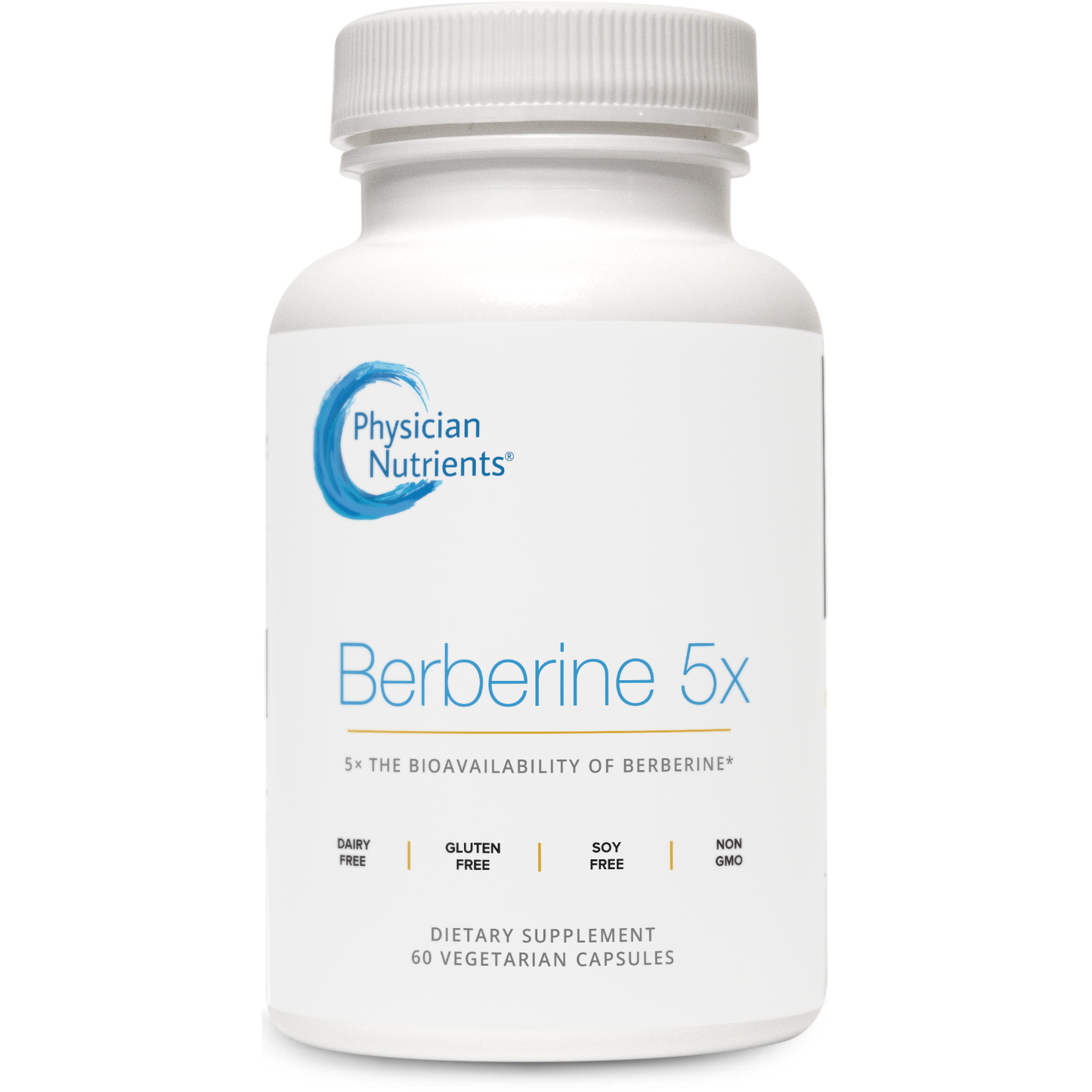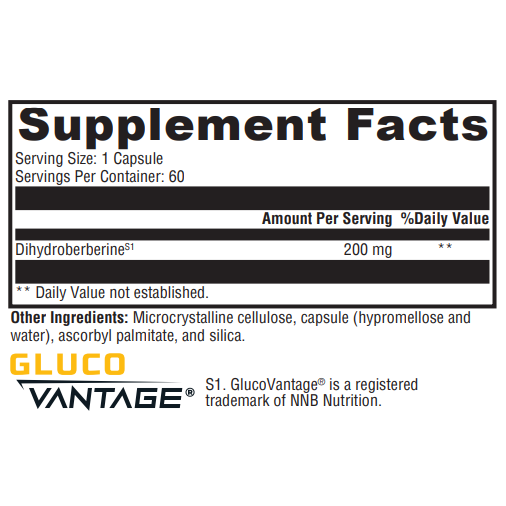Berberine 5x
Berberine 5x
Couldn't load pickup availability
60 Vegetarian Capsules
Berberine 5x features dihydroberberine (DHB), a highly bioavailable metabolite of berberine with demonstrated benefits for blood glucose metabolism. Berberine naturally occurs in several plant species used extensively in traditional Ayurvedic and Chinese herbal practices; DHB is the natural bioactive form of berberine.*
Applications
- Supports Enhanced Berberine Activity*
- Supports Healthy Blood Glucose Metabolism*
All Physician Nutrients® Formulas Meet or Exceed cGMP Quality Standards
Directions
Take one capsule once or twice daily, or use as directed by your healthcare professional.
Consult your healthcare professional before use. Individuals taking medication should discuss potential interactions with their healthcare professional. Do not use if tamper seal is damaged.
Does Not Contain: Wheat, gluten, yeast, soy, animal or dairy products, fish, shellfish, nuts, tree nuts, artificial colors, sweeteners, or preservatives.
Supportive Science*
Although the mechanisms underlying the beneficial effects of berberine are not entirely clear, it is hypothesized that the modulation of gut microbes may be one mechanism by which berberine affects blood glucose metabolism.6 Results from animal and in vitro studies suggest that berberine moderates glucose and lipid metabolism through a multi-pathway mechanism, including the adenosine monophosphate–activated protein kinase (AMPK), c-Jun N-terminal kinase (JNK), and peroxisome proliferator-activated receptor (PPAR)-alpha pathways.2,7 Separate research on AMPK reports activating the AMPK pathway stimulates glucose uptake and fat oxidation while suppressing lipogenesis and gluconeogenesis.8 Berberine is also believed to be involved in the regulation of pancreatic beta cell function, and it has been observed to inhibit the expression of disaccharidases in the duodenum, resulting in less glucose formation from carbohydrate digestion.
Increasing evidence indicates that gut microbiota are also crucial mediators that regulate berberine’s pharmacokinetic and biological effects. Berberine induces compositional alterations in gut microbiota and regulates gut microbe–dependent metabolites, factors that contribute to its biological effects on lipid and glucose metabolism.10,11 Additionally, gut microbiota reduce berberine to DHB, its intestine-absorbable form, which then oxidizes back to berberine after it has been absorbed into intestinal tissues and entered the blood.
Berberine absorption across the intestinal epithelia is suggested to be compromised because of its “flat” chemical configuration. Berberine displays poor bioavailability and increased potential for GI distress at the oral doses required to improve biomarkers associated with glucose homeostasis.3 The structure of the DHB derivative of berberine is comparably open, making it more amenable to uptake. To further explore the absorbability of berberine and DHB, researchers investigated the mechanism of action by which AMPK is activated and if using DHB at lower doses than berberine could potentially improve the effect on adiposity and glucose metabolism in rodents fed a high-fat diet. Berberine had to be administered at a nearly 5-fold increased dose of 560 mg/kg/d to establish the same effects demonstrated by DHB at 100 mg/kg/d. The rodents treated with the substantially lower dose of DHB showed markedly reduced adiposity and improved glucose tolerance. Additionally, insulin sensitivity was increased in the DHB-treated animals. These results led researchers to suggest that the difference in effects between berberine and DHB is due to the enhanced bioavailability of DHB. The findings of this study indicate that DHB delivers the beneficial metabolic effects of berberine in a more absorbable form and at a lower dose.
A small, randomized, double-blind, crossover pilot study (N = 5) investigated the absorption kinetics and compared the dosing of berberine and DHB required to achieve peak plasma concentrations. Subjects completed a 4-dose protocol of placebo, 500 mg of berberine, 200 mg of DHB, and 100 mg of DHB. Participants ingested the first 3 doses with breakfast, lunch, and dinner, followed by an overnight fast, then a standardized test meal accompanied by dose 4. Blood samples were collected at regular intervals after ingestion and analyzed for berberine, glucose, and insulin. Four doses of 100 mg and 200 mg of DHB produced significantly greater concentrations of plasma berberine across the 2-hour measurement window than a 500-mg dose of berberine or placebo. Results suggest that irrespective of dose, DHB achieves a greater area under the curve and peak berberine concentrations when compared with oral ingestion of berberine.*12
Physician Nutrients®’s Berberine 5x contains DHB originating from berberine sourced from Berberis aristata and naturally extracted through an enzymatic process similar to that which occurs in the human gut. With a 5-fold relative increase in absorption rate, supplemental DHB at much lower doses than berberine has comparable beneficial metabolic effects.*
*These statements have not been evaluated by the Food and Drug Administration. This product is not intended to diagnose, treat, cure, or prevent any disease.
Share




